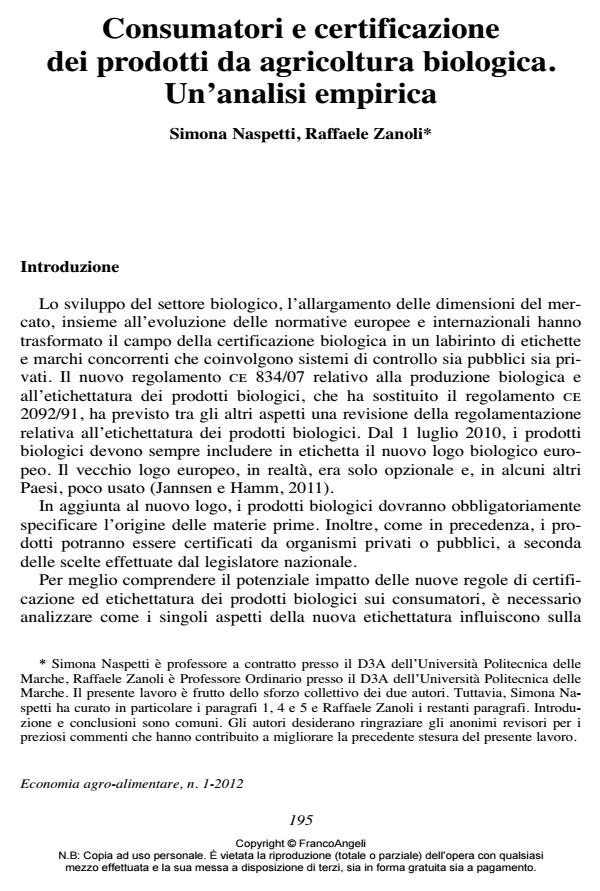Consumers and organic product certification. An Empirical analysis
Journal title ECONOMIA AGRO-ALIMENTARE
Author/s Simona Naspetti, Raffaele Zanoli
Publishing Year 2012 Issue 2012/1
Language Italian Pages 21 P. 195-215 File size 225 KB
DOI 10.3280/ECAG2012-001009
DOI is like a bar code for intellectual property: to have more infomation
click here
Below, you can see the article first page
If you want to buy this article in PDF format, you can do it, following the instructions to buy download credits

FrancoAngeli is member of Publishers International Linking Association, Inc (PILA), a not-for-profit association which run the CrossRef service enabling links to and from online scholarly content.
According to the new organic (Regulation (ec) No 834/2007, a mandatory eu logo for organic food was introduced as well as new guidelines to label organic products. In the new labelling the indication of origin of the raw materials is compulsory: ‘eu Agriculture’, ‘non-eu Agriculture’ or ‘eu/non-eu Agriculture’. When all agricultural raw materials came from the same country, the terms ‘eu’ and ‘non-eu’ can be replaced or supplemented by the name of that country. The name of the Organic certifier can be also signalled to final consumers by the product labelling. In some eu countries (Denmark and Germany) the product label based on a third-party certification, private or public, make them trust the underlying certification scheme. Although consumers often lack knowledge on organic certification and organic farming practices in general, several studies highlight that scepticism and uncertainty towards organic logos and certification prevent consumers from buying more organic food. The present study analyses how consumers perceive some of the most important aspect of the new labelling regulation (the origin of raw materials and the organic certifier for organic food). Few studies exist on consumer views on organic labelling for organic food and willingness to pay for trust in the organic food quality (Burrell et al., 2006). The recommendations drawn from our findings can help stakeholders in the Italian organic sector. 415 consumers in three Italian locations (Ancona, Milano, Bari) participated to a survey in March 2010. The results show that the organic consumers prefer organic products from Europe and trust products certified by Italian (more than from foreign countries) and public certification bodies (more than private). These findings suggest the need for transparency of the complexity of the organic certification and accreditation system, unknown to most of the consumers. There is a need to make them clear what the new label characteristics stand for and remove consumer concerns of the standards and the trustworthiness of the inspection system.
Keywords: Organic food certification, indication of origin, consumer perceptions, wtp
Jel codes: Q13, C25, D12
- European Consumers’ Willingness to Pay for Red Meat Labelling Attributes Emilia Cubero Dudinskaya, Simona Naspetti, Georgios Arsenos, Emmanuelle Caramelle-Holtz, Terhi Latvala, Daniel Martin-Collado, Stefano Orsini, Emel Ozturk, Raffaele Zanoli, in Animals /2021 pp.556
DOI: 10.3390/ani11020556 - An Integrative Conceptual Framework of Food Certifications: Systematic Review, Research Agenda, and Macromarketing Implications Maria Elena Latino, Angelo Corallo, Marta Menegoli, Biagio Nuzzo, in Journal of Macromarketing /2022 pp.71
DOI: 10.1177/02761467211049071
Simona Naspetti, Raffaele Zanoli, Consumatori e certificazione dei prodotti da agricoltura biologica. Un’analisi empirica in "ECONOMIA AGRO-ALIMENTARE" 1/2012, pp 195-215, DOI: 10.3280/ECAG2012-001009